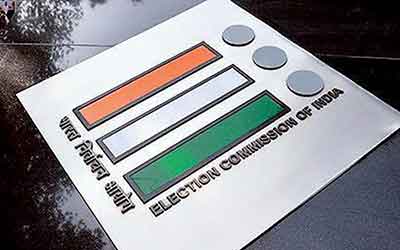Date: 06/10/2022
Relevance: GS-2: Appointment to various Constitutional posts, powers, functions and responsibilities of various Constitutional Bodies.
Key Phrases: Financial Viability Of Their Poll Promises, Guidelines On Election Manifesto, Rationalizing Expenditure, Impact On Committed Liabilities Fiscal Responsibility And Budget Management Act, Competitive Electoral Promises
Why in News?
- The Election Commission (EC) has recently proposed to amend the model code amid a debate on the freebies.
- The amendment will require the political parties to provide authentic information to voters on the financial viability of their poll promises.
What are the changes that the EC has proposed to the model code?
- The poll panel has proposed to amend the Model Code of Conduct to add a proforma to Part VIII (Guidelines on election manifesto) of the MCC.
- It will require political parties to inform voters about the financial feasibility of promises made in their manifestos, the number of beneficiaries expected to be targeted by the schemes promised, and also whether they are sustainable within the financial space of the state or the Union government
- The proposed proforma will seek details of revenue generation ways (through additional tax, if any), rationalizing expenditure (cutting some schemes, if so required), impact on committed liabilities and/or raising of further debt and its impact on Fiscal Responsibility and Budget Management Act (FRBM) limits.
- Although the implementation of election promises can have several ramifications, the Commission has proposed to confine the disclosures to only the financial implications of the promises in terms of the financial resources required.
What is the rationale behind the move?
- Ambiguous and vague declarations by political parties:
- While the existing guidelines under MCC require the political parties and candidates to explain the rationale for promises made therein as well as the possible ways and means to finance such promises, it has been observed that the declarations are quite routine, ambiguous and do not provide adequate information to voters to exercise informed choice in an election.
- Hampering of financial sustainability:
- The EC is of the view that the empty poll promises have far-reaching ramifications and undesirable impacts on financial sustainability which can't be overlooked.
- Competitive electoral promises:
- The consequences of inadequate disclosures by political parties get attenuated by the fact that elections are held frequently, providing opportunities for political parties to indulge in competitive electoral promises, particularly in multi-phase elections, without taking into consideration the financial implications more particularly on committed expenditure.
- Undermining of free and fair elections:
- Some of the promises and offers have an undesirable impact on the conduct of free and fair elections and on maintaining a level playing field.
- Standardized disclosure proforma:
- The electoral reform will not only bring about a standardized disclosure proforma for the guidance of political parties and candidates but will also ensure authentic information to the voters to assess the financial viability of election promises.
- Informed poll choices:
- Most political parties do not submit to the EC their poll declarations in time and with adequate disclosures on the financial implications of the promises made, the Indian electorate will be able to exercise informed poll choices.
What is the model code of conduct (MCC)?
- Election Commission of India's Model Code of Conduct is a set of guidelines issued by the Election Commission of India for the conduct of political parties and candidates during elections mainly with respect to speeches, polling day, polling booths, portfolios, election manifestos, processions, and general conduct.
- This set of norms has evolved with the consensus of political parties who have consented to abide by the principles embodied in the said code in its letter and spirit.
- The MCC comes into force immediately on the announcement of the election schedule by the commission for the need to ensure free and fair elections.
Objectives of MCC:
- Its main purpose is to ensure that ruling parties, at the Centre and in the States, do not misuse their position of advantage to gain an unfair edge.
- The document guides the EC in ensuring a level playing field for all political parties and candidates during elections.
- It is designed to avert practices that are deemed corrupt under the model code of conduct. For example, politicians should not make hate speeches, put one community against another, invoke religion or make promises about new projects that may sway a voter.
- It has no legal backing and is only a voluntary understanding between the EC and the political parties that comes into play during the election process.
Source: The Hindu BL
Mains Question:
Q. What are the changes that the EC has proposed to the model code of conduct? Explain its significance. (150 words).






















